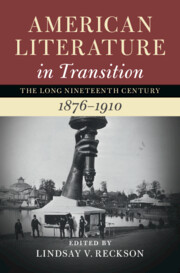Book contents
- American Literature in Transition, 1876–1910
- Nineteenth-Century American Literature in Transition
- American Literature in Transition, 1876–1910
- Copyright page
- Contents
- Contributors
- Series Preface
- Acknowledgments
- Chronology
- Introduction
- Part I Transitive States
- Part II Post-Reconstruction Aesthetics
- Part III Old Materialisms
- Part IV Immanent Techniques
- Index
Introduction
We Have Never Been Post-Reconstruction
Published online by Cambridge University Press: 24 August 2022
- American Literature in Transition, 1876–1910
- Nineteenth-Century American Literature in Transition
- American Literature in Transition, 1876–1910
- Copyright page
- Contents
- Contributors
- Series Preface
- Acknowledgments
- Chronology
- Introduction
- Part I Transitive States
- Part II Post-Reconstruction Aesthetics
- Part III Old Materialisms
- Part IV Immanent Techniques
- Index
Summary
Late in the evening of January 6, 2021, in the aftermath of an armed attack on the US Capitol building, South Carolina Senator Lindsey Graham addressed a hastily reconvened joint session of Congress. In the wake of a violent effort by right-wing nationalist and white supremacist groups to halt the certification of the 2020 presidential election, Graham offered an odd and meandering history lesson on the contested election of 1876:
1876, South Carolina, Louisiana, and Florida sent two slates of electors – they had two governments by the way – and we didn’t know what to do … to hold the country hostage to end Reconstruction. It worked. The commission was 8 to 7. It didn’t work. Nobody accepted it … The rest is history. It led to Jim Crow. You’re looking for historical guidance, this is not the one to pick.
- Type
- Chapter
- Information
- American Literature in Transition, 1876–1910 , pp. 1 - 14Publisher: Cambridge University PressPrint publication year: 2022



